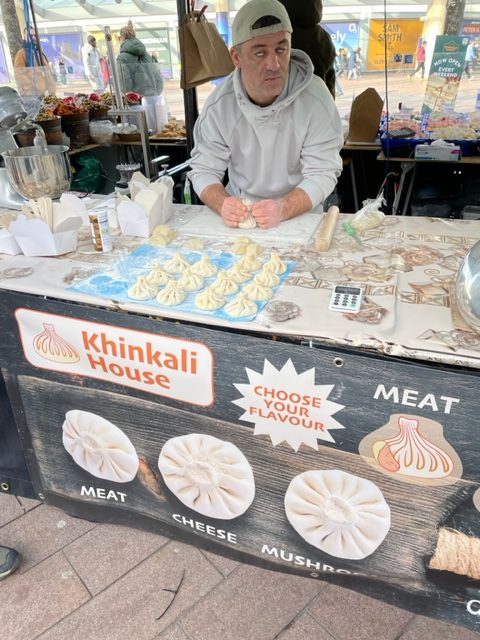Row at Georgian khinkali stall in London brings home the ugliness of a faraway war

The row at the Georgian khinkali stall in London is a reminder of the ugliness of war, even a faraway one.
The circumstances were ordinary. A pop-up food stall was serving a little knot of people in the British capital. Each of us had to wait the requisite eight minutes for the khinkali-makers to boil up the dumplings, yet another well-loved Georgian food offering. There were three fillings – beef, mushroom, cheese. The khinkali-maker was busy rolling them into shape and popping them onto a board, from which his colleague plucked individual pieces, shaped like money bags, and boiled them in large pots. She was aided by a stopwatch. At £2.25 a pop, Georgia’s famous dumplings weren’t cheap. And they took time to prepare. This was not fast food, literally and metaphorically.
The number of people gathered around the khinkali stall was boosted by some Russians who stopped to chat with the stall-owners. They didn’t order any khinkali, restricting themselves instead to conversation, which was conducted in Russian. One of those in animated conversation was a large woman with thick mascaraed lashes and a face that bore traces of beauty.
Suddenly, a row seemed to break out, with the large lady snapping at a youngish man a little behind her: “Do you understand English? You can’t speak to me like that.”
The man answered her in Russian, then muttered “Ukraine war” in English. He continued to speak a mixture of Russian and English and so did she, telling everyone that he was asking her to go back to Russia because of the Ukraine war.
“Why should I?” she yelled at him. “Why don’t you go to Ukraine and defend your country? Why are you still here?”
They raged at each other for five minutes, finishing with up-yours signs and rude words.
Meanwhile, the khinkali stall’s customers, waiting patiently and hopefully for their dumplings, studied their shoes, or if they had a companion, spoke softly to them.
It seemed to be a classic lesson in the bystander effect, which is to say that people are less likely to offer help (or to intervene) when they are in a group than when they are alone.
And, it was a painful reminder of the deep trauma caused by wars, even though one that is nearly 2,000 miles away.

